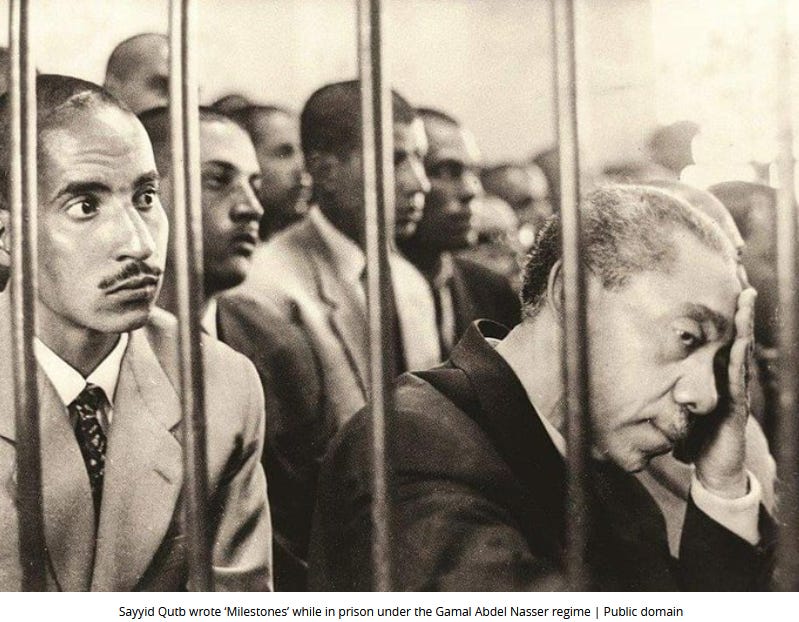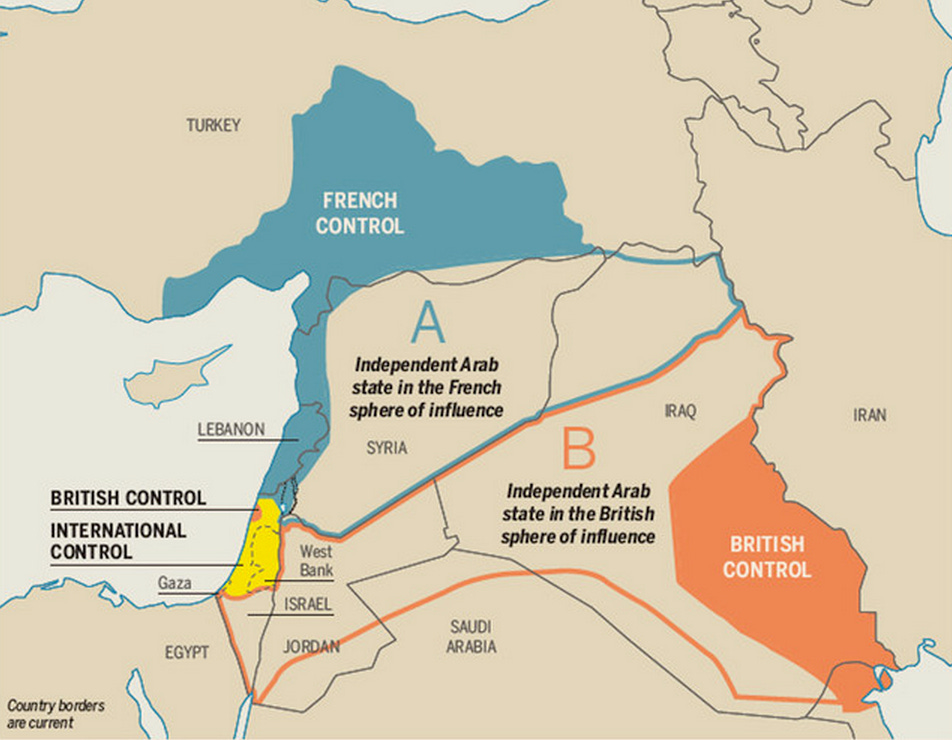A Requiem For Ba'athism (Part 1 of 3)
The collapse of the Syrian Government and its historical context, a century of Arab humiliation, Islamic Fundamentalism, and the birth of Ba'athism
It took less than two weeks for the Syrian government to fall and for Hay'at Tahrir al-Sham (HTS) to almost effortlessly march into the country’s capital, Damascus, ending six decades of Ba’athist rule in the country, five of which were directly under the Assad family.
The collapse was quick; what was intended as a limited offensive to reach the Sunni suburbs of West Aleppo from Idlib Province ended up in the mass surrender of regime forces. Adolf Hitler is reported to have said of 1941 USSR that: “You only have to kick in the door and the whole rotten structure will come crashing down!”. That turned out not to be true in that case, but it aptly describes what we all just witnessed take place in Syria.
The rush to Aleppo seemed like another suicidal dash as is typical of extremist Sunni groupings….but then they captured the entire city, the second largest in the country. The HTS-led forces then streamed south towards Hama, easily capturing that city. “The regime could still survive this”, thought many, as it has always been a hotbed of Sunni radicalism. Everything rested on Homs, the next large city to its immediate south. If it fell, Damascus and its environs would be cut off from the coast, the heartland of the Alawites, the Shi’ite sect to which the Assad family belongs.
Homs fell without much of a fight, and regime forces were split in two. Shortly thereafter, Sunnis in Dara’a Province (to the south of Damascus) rose up and took over government and military facilities. The US-backed and Kurdish-led SDF had already begun moving days earlier to shore up their positions in the east of the country, taking over government positions without shots being fired. Homs fell to HTS on December 8th, with the capital Damascus capitulating only hours later.
And just like that, the Assad Dynasty came to an end.
I want to take a look at how the regime collapsed in Syria so quickly, but I think that it is more important to put what just took place into a larger context, geopolitically, historically, and culturally. Many others have published reports and essays on the events of the past several weeks and how they were the ‘inevitable result’ of the Syrian Civil War, but I think it would best serve us to peer deeper into the past to see beyond recent events in order to try and understand just how significant the changing of the guard in Damascus really is.
Tying Up Loose Ends
The ease with which HTS strolled into Hama signaled to me that the regime in Damascus was done for. Being a conservative type who likes to hedge, my gut was telling me that the rapid fall of Aleppo to the cleaned-up Islamists of al-Qaida’s re-re-re-named local branch office clearly indicated that Bashar Assad was approaching the end of his time in office, but the continuous bombardment of the advancing Mujahideen by Russian aviation served as a caution to not jump to that conclusion too quickly. Syria was not just a venue of the fight between government forces and the Sunni radicals (and Kurds too), but of outside forces like the Iranians, Hezbollah, ISIS, Turkey, Israel, and those very same Russians. Multiply the stakeholders and betting large becomes very, very risky.
By the time HTS rolled up to the outskirts of Homs, no rally was in sight. Despite persistent Russian airstrikes, Hezbollah had not moved a muscle to aid its Syrian ally, and even more importantly, Iran didn’t lift a finger to rescue its protege. Worse still, the Syrian Arab Army no longer had any fight left in it, as demoralization, defections, and outright betrayal had set in. There was to be no heroic last stand, just a domino effect of local deals to hand over power, all beginning with that nudge towards West Aleppo and ending with Bashar Assad fleeing into exile in Moscow.
Prior to the outbreak from Idlib, things seemed to be quieting down in the Levant: Hezbollah had agreed to a ceasefire with the IDF, while the latter kept re-arranging the rubble in Gaza through bombing strikes. Most eyes were diverted elsewhere, divided between Trump’s cabinet picks and appointment nominees, and the war in Ukraine where the incoming White House administration is expected to force Kiev to come to an agreement with Moscow to wind down that war. The events in Syria arrived like a bolt from the blue, and when the dust (what little was thrown up into the air) settled after HTS seized Aleppo, my mind was immediately taken back to one generation ago, to precisely when then-ex US General and presidential candidate Wesley Clark said the following:
A former commander of NATO’s forces in Europe, Clark claims he met a senior military officer in Washington in November 2001 who told him the Bush administration was planning to attack Iraq first before taking action against Syria, Lebanon, Libya, Iran, Somalia and Sudan.
The general’s allegations surface in a new book, The Clark Critique, excerpts from which appear in the latest edition of the US magazine Newsweek.
Clark says after the 11 September 2001 attacks, many Bush administration officials seemed determined to move against Iraq, invoking the idea of state sponsorship of terrorism, “even though there was no evidence of Iraqi sponsorship of 9/11 whatsoever”.
Ousting Saddam Hussein promised concrete, visible action, the general writes, dismissing it as a “Cold War approach”.
Clark criticises the plan to attack the seven states, saying it targeted the wrong countries, ignored the “real sources of terrorists”, and failed to achieve “the greater force of international law” that would bring wider global support.1
I have never found out if there was any truth to this charge, but it would not surprise me one bit if it were true; this was the peak era of US neo-conservatism after all.
Immediately after recalling Clark’s incendiary charge, my next step was to tie it into the war in Ukraine, specifically the moves to begin negotiations to end the fighting. I thought to myself: “Syria is an important asset to Moscow as it is both a client state and the location of its naval re-filling station, permitting it to project its power further away onto the African continent. To take away this vital asset would give the USA more leverage over Russia regarding negotiations over Ukraine.”
Syria was taken off of the table in less than two weeks. Several have argued with me, insisting that HTS’ ‘speedrun’ was entirely a Turkish affair, but I refuse to believe that the Turkish military did not coordinate it with the USA and get its blessing from the Department of Defense, and by extension, the White House. US forces are still on the ground in Syria, some 2,000 strong, and US aviation helped clear the way for HTS to seize power from the government in certain parts of the country.2 Was the surprising collapse of the Syrian regime actually not that surprising to at least one of its major enemies? Did the Americans take advantage of the diverted attention of Russia, Hezbollah, and Iran to capture an opposing rook? And lastly, was the fall of the Assad regime the tying up of loose ends left over from the 2003 Iraq War?
What can be stated with 100% certainty is that the Assad regime was an anachronism, a relic of the long-gone Cold War era. Its collapse also officially ends the political philosophy known as Ba’athism, one of the two main reformist strains that dominated the post-WW2 Arab World.
A Century of Arab Humiliation
It started off so promising.
The Ottoman Empire had thrown its lot in with the Germans and Habsburgs in WW1, a move that resulted in the final deaths of all three empires, two of them centuries-old. Long-deried as the “sick man of Europe”, the Ottoman Empire still laid claim to being the Caliphate and therefore the leader of the Islamic world. However, it had been fraying at the edges for some time, and the First World War created an opportunity for those living under the rule of the Sultan to chip away at its crumbling facade, aided by outside forces such as the British who rallied Arab tribes south of Anatolia. The sick man of Europe breathed his last, his corpse pulled in several different directions all at once.
To many an Arab, the fact that the Caliphate was for centuries in the hands of the non-Arabic Turks was a major insult.3 After all, Allah’s greatest prophet, Mohammad, was himself an Arab, and the two holy cities, Mecca and Medina, lay within Arab lands. Futhermore, the Qur’an was “revealed” to Mohammad by the angel Gabriel, and royal scribes were ordered to record it in its entirety shortly after the Prophet’s death. The language that it was transcribed in was Arabic. Nor was this resentment entirely a confessional one as many Arabs are Christian, making the Turk an even more foreign ruler in their eyes. The collapse of The Porte opened the path to Arab liberation from the Turkish yoke, even if technically the Ottoman Empire was the Caliphate and therefore non-ethnic in legal and philosophical terms.
“Isn’t there someone that you forgot to ask?” That someone was Europe. Battered, bloodied, and bruised from the most savage and deadly war known to mankind up until that point in history, Europe’s great powers were somehow still not exhausted by it. Having raced ahead of the rest of the world in terms of technological and industrial advancement, they glanced over to the Middle East with envy, seeing the incredible bounty of oil that they did not have at home, but that did lay under the ground there, oil that they needed to power their modern national (and still imperial) economies. The Russians had locked down Baku and its oil wells for some time, but France and Britain would not let the barely-exploited oil fields of Mesopotamia, the Persian Gulf, the Hejaz, etc., out of their grasp. France and Britain moved quickly to re-partition the Middle East, denying the Arabs (and others) their perceived right to self-rule. The Arabs went from the frying pan into the fire.
Many of you are familiar with the Sykes-Picot Agreement in which the British and French hatched a secret plan to partition the Middle East in the event of a Triple Entente victory in WW1. The plan was leaked in 1917, upsetting the Arabs who felt that the British had stabbed them in the back after promising them self-rule, and delighting the Turks who told their Arab subjects that they were being used by the West for their own purposes. This essay is not the place to delve into the double-dealing and triple-crossing that coloured the war years and the first few years after its end, but suffice it to say that Britain and France got their way, a Turkish state was born on the ashes of the now-defunct Ottoman Empire (stymying Anglo-French plans in Eastern Anatolia and the Sea of Marmara), and the Arabs found themselves under western rule, largely cheated of their desired liberation from foreign domination. Most ominously of all, the British secured a mandate to rule Palestine.
The Sykes-Picot Agreement (1916)







